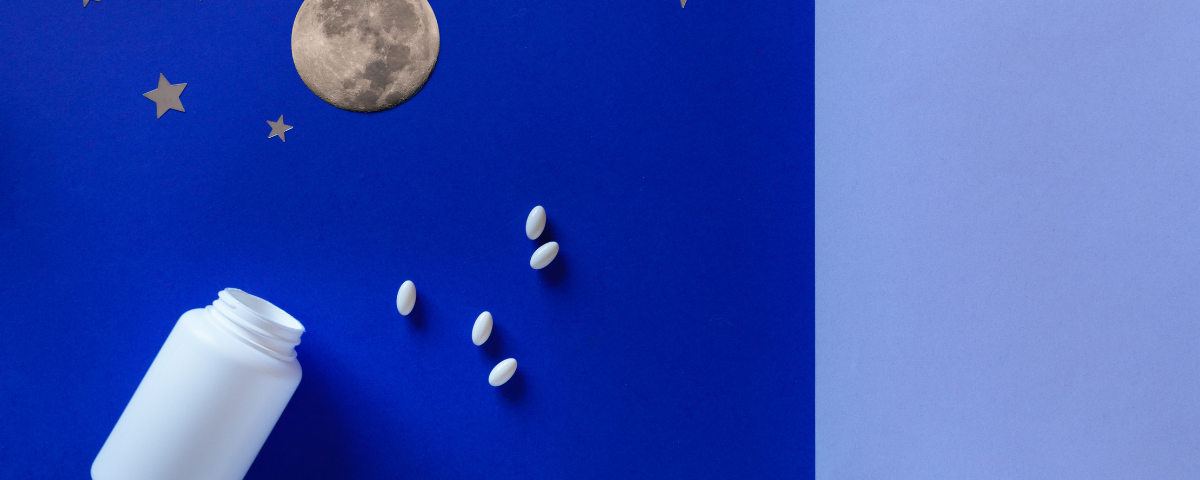According to research, adults in America that consume Melatonin do it for 211 days per year. While Melatonin is known to assist with sleep, there may be other suitable options for some. So, today, we will explore alternatives to Melatonin.
We will focus on natural sleep aids that enhance sleep quality and regulate sleep-wake cycles without Melatonin. Firstly let’s establish what this famous sleep aid is.
What is Melatonin?
The brain’s pineal gland creates Melatonin, which is a hormone. Regulating our sleep-wake cycle is crucial, and Melatonin plays a significant role in this process.
The body naturally releases Melatonin when in darkness, signaling it’s time to sleep. However, factors like jet lag, shift work, or excessive screen time can disrupt this process, leading to sleep problems.
Benefits of Melatonin for Sleep
Several key benefits of Melatonin make it a popular choice for those struggling with sleep:
1. Helps Regulate Sleep Cycles
Melatonin is integral to regulating our circadian rhythms, also known as our internal body clocks. These rhythms dictate when we feel alert and when we feel sleepy. Taking a melatonin supplement may help reinforce your body’s sleep-wake cycle.
2. Aids with Sleep Disorders
If you have trouble sleeping, Melatonin might significantly help you. It’s particularly useful for those diagnosed with insomnia. It can expedite the onset of sleep and prolong the duration of your rest.
3. Reduces the Impact of Jet Lag
Traveling across time zones can disrupt your internal body clock, leading to jet lag. It has been found that Melatonin can help alleviate the effects of jet lag. Therefore, it can help adjust the body’s sleep-wake cycle in a new time zone.
4. Safe for Short-Term Use
Melatonin is generally safe for short-term use, making it a go-to solution for temporary sleep disruptions.
While Melatonin does have its benefits, it’s important to note that it isn’t a one-size-fits-all solution.
Why Look for Alternatives to Melatonin?
While melatonin supplements can be an effective short-term solution, they have drawbacks and can have side effects. Therefore, alternatives such as sleep supplements to Melatonin are worth considering for improving sleep quality.
What are Sleep Supplements
If you are new to our blog, you may have yet to hear about sleep supplements.
As the name hints, this category of supplements is taken to aid or improve sleep. These products can contain various ingredients, ranging from minerals and vitamins to herbal extracts and hormones.
They are often used by individuals who have trouble falling asleep or staying asleep or those looking to improve the overall quality of their sleep. One of the many benefits of sleep supplements is that they are natural aids, unlike prescription pills, have mild to no side effects and are non-addictive.
Many sleep supplements can be alternatives to Melatonin, for example:
Valerian Root
Valerian root is a natural sleep aid used for centuries. It is thought to engage with GABA neurotransmitters to promote sleep and alleviate anxiety.
Chamomile
For centuries, chamomile was utilized as a natural remedy. This herb, which resembles a daisy, has calming effects on the mind and body that are highly valued, and it is frequently consumed as a tea.
Therefore, it helps sleep and can also reduce anxiety.
Lavender
Lavender is a plant with a calming smell. It is commonly used by individuals to assist with relaxation and improve their sleeping habits.
For example, you can put a few drops of lavender oil in your room or use a lavender spray on your pillow. You could also try lavender tea before bed.
Magnesium
Magnesium is a mineral our bodies need. It helps with many things, including sleep. If you don’t have enough magnesium, sleeping is hard.
You can get more magnesium from spinach, pumpkin seeds, and almonds. You can also take a magnesium supplement.
Theanine
Theanine is an amino acid found in green tea leaves. It can help you feel relaxed and improve your sleep quality. You can drink tea to get theanine or take it as a supplement.
Glycine
Another powerful amino acid that your body uses to produce proteins, which are crucial for almost every aspect of health. Beyond this fundamental role, research has shown that glycine can significantly improve sleep quality.
Prescription Sleep Aids
While natural sleep aids are a great option, some sleep problems may require a stronger approach. Prescription sleep aids can be an effective short-term solution under a doctor’s supervision.
However, they should be used as a last resort due to potential side effects and the risk of dependency.
Sleeping pill’s side effects include:
- Attention problems;
- Changes in appetite;
- Constipation;
- Daytime sleepiness;
- Diarrhea;
- Dizziness;
You may also want to consider exploring the role of mindfulness and relaxation techniques in promoting better sleep:
Mindfulness and Relaxation Techniques
Techniques like deep breathing, meditation, and yoga can help you relax before bed. This can make it easier for you to fall asleep. Many apps and online resources are available to guide you through these techniques.
In our other blog posts, we explore different relaxation techniques, such as meditation and listening to brown and white noise:
Lifestyle Changes
In addition to these alternatives, lifestyle changes can significantly impact sleep quality.
All of them, like regular exercise, a healthy diet, and good sleep hygiene, can help improve sleep. Besides that, you can also try limiting caffeine and screen time before bed, maintaining a regular sleep schedule, and creating a calm sleep environment can also help.
The role of exercise
Engaging in regular physical activity can assist in falling asleep quicker and experiencing more restful sleep.
It’s not entirely understood why this occurs, but it seems connected to the body’s need for recovery after exerting energy during exercise.
Furthermore, exercise can help regulate your body’s internal clock, or circadian rhythm, mainly if it’s done outside in natural light.
This can be especially beneficial for people suffering from insomnia or disrupted sleep schedules.
1. Types of Exercise for Better Sleep:
Different types of exercise can have varying effects on sleep:
- Aerobic Exercise: Activities like running, cycling, or swimming increase your heart rate and can significantly improve sleep quality. Regular aerobic exercise has been linked to increased total sleep time and more restful sleep.
- Strength Training: Resistance or weight training can also improve sleep. A study found that regular resistance exercises can improve all aspects of sleep quality.
- Yoga and Mindfulness-Based Exercise: Practices like yoga and tai chi combine physical activity with mindfulness and relaxation techniques. These types of exercises can reduce anxiety and promote better sleep.
The Role of Diet
While looking for alternatives to melatonin, it’s vital to understand that the diet also plays a role in how well you sleep. Certain foods are known to promote sleep.
For example, foods rich in magnesium, like almonds and spinach, can help improve sleep quality. On the other hand, spicy or fatty foods can disrupt your sleep, so it’s best to avoid them close to bedtime.
Let’s understand them better:
1. Dietary Components:
Certain dietary constituents directly impact sleep by triggering the release of hormones that encourage sleep or by helping synchronize your body’s sleep-wake cycle. Here are a few examples:
- Tryptophan: This vital amino acid is crucial in producing serotonin and Melatonin, hormones instrumental in sleep regulation. Foods abundant in tryptophan include poultry, seafood, dairy, seeds, nuts, and legumes.
- Magnesium: This mineral helps to reduce adrenaline levels and can encourage muscle relaxation, potentially leading to more restful sleep. Foods like leafy greens, legumes, nuts, seeds, and whole grains are excellent sources of magnesium.
- Calcium: Calcium aids the brain in utilizing the amino acid tryptophan to create Melatonin. Foods high in calcium include dairy products, fortified foods, and leafy green vegetables.
2. Meal Timing and Composition:
The timing and content of your meals can also significantly affect the quality of your sleep. Eating a large meal too close.
The circadian rhythm, which controls our sleep patterns, is heavily influenced by it. Eating close to bedtime can disrupt sleep as your body is busy digesting the food.
On the other hand, not eating before going to bed can also cause problems with sleeping. Aim for a well-rounded meal a few hours before bedtime, and if you feel peckish later on, opt for a small snack.
- Foods High in Spice and Fat: Consuming spicy or high-fat foods before sleep can lead to indigestion and heartburn, disrupting sleep.
- Caffeine and Alcohol: Both of these substances can drastically affect the quality of sleep. Caffeine, a stimulant, can make it challenging to fall asleep if consumed later in the day. While alcohol might initially make you tired, it can disturb sleep patterns and result in less rest.
3. Importance of Hydration:
Maintaining proper hydration is vital for your overall health and can also influence the quality of your sleep.
Insufficient fluids can lead to a dry mouth and throat, causing discomfort and possible sleep disruptions. However, consuming a large amount of liquid right before bedtime might increase the frequency of urination during the night, thereby interrupting your sleep.
Conclusion
Sleep problems can be frustrating and detrimental to overall health. While melatonin supplements can be helpful, they are not the only solution.
Alternatives to melatonin like valerian root, glycine, and lifestyle changes, can offer a more sustainable approach to improving sleep quality.
Remember, achieving good sleep is not a one-size-fits-all solution. It’s about finding the best for you and your unique sleep needs.
Disclaimer: The information provided in this article is for informational purposes only and is not intended to substitute for professional medical advice, diagnosis, or treatment.



